

Jeon, ran
South Korea 2024
Genre:
Action, Drama, Period
Director:
Kim Sang-man
Cast:
Gang Dong-won
Park Jeong-min
Kim Shin-rok
Jin Seon-kyu
Jung Sung-il
Cha Seung-won

Uprising
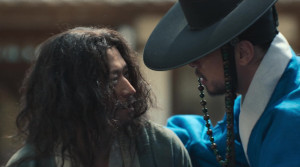
Story: Cheon-yeong has been a slave since he was a child. So, he is sold to the 14th King of the Joseon Dynasty Seon-jo (Cha Seung-won). In the meantime, the king wants his son Jeong-ryeo to learn how to fight. However, he is not very skilled and instead of him little Cheon-yeong is punished. At some point, Cheon-yeong is fed up with taking all the hits on his behalf and he starts teaching Jeong-ryeo, who is almost the same age, how to fight. The little slave boy has an extremely trained eye and was able to learn a lot from the masters. Years later, Jeong-ryeo (Park Jeong-min) is grown up and supposed to take the civil service exam as the king's future successor. He repeatedly fails, though. Cheon-yeong (Gang Dong-won) offers to secretly participate, pose as the king's son and pass the test with top results. In return, he no longer wants to be a slave. The king agrees and Cheon-yeong actually fulfills his part of the deal. Nevertheless, the king does not let him go. Therefore, the slave decides to flee, but is eventually caught again. Shortly afterwards, though, the Japanese attack. The royal family has to flee the palace and Cheon-yeong also manages to escape in the chaos. The palace burns down after the slaves have taken revenge on the rest of the nobles, and Jeong-ryeo's wife and child are also killed in the process. Later, the king's son will blame his former friend, but first the country is plunged into a seven-year war ...




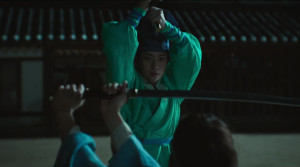
Review: It took me a long time to warm up to historically inspired period movies from Korea. You sometimes feel like they are just copies of wuxia movies, but without ... wuxia. Maybe I just wasn't the right audience for these kinds of movies, but in the meantime - and to be precise for several years now - a lot has happened in the field so that every now and then, you can come across (very) good representatives of the genre. "Uprising" falls into this category and combines a few historical cornerstones with a moral story about equality as well as beautiful action that doesn't shy away from showing some severed limbs. The end result, also thanks to a good cast, is quite impressive. This shouldn't come as a complete surprise, though, after all, Park Chan-wook ("Decision to Leave") produced the movie for Netflix and co-wrote the script too. Moreover, the story is what keeps the movie exciting, although it has to be mentioned from a more critical standpoint that it sometimes seems a bit overloaded. But since the focus is always on the two former friends, you have an anchor that keeps you connected to the events.
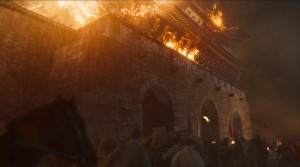
At the beginning it is made clear that King Seon-jo does not tolerate any efforts or gatherings which promote the equality of slaves and citizens or even the aristocracy. So, there are often heads of rebels hanging from banners in the city. A sight to which the residents have long since become accustomed, so that they simply continue to go about their daily business. Entering the picture are the king's son Jeong-ryeo and the slave Cheon-yeong, between whom a friendship starts to develop, which of course simply cannot be. There is never any doubt that this will lead to confrontation, but you would expect the king's influence or the pressure of society to be the inevitable cause for the growing enmity between the two. However, this is just partly the case, and instead it is more of a misunderstanding that leads to it. To be honest, this is one of the biggest weaknesses of the story. How strong can the friendship really be if one (mis)information is enough to declare someone as your mortal enemy? Admittedly, this is nothing seriously new and even in classic literature this is mostly the basic hook for betrayal and blood feuds, but it still seems a bit arbitrary.
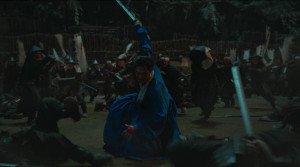
But the invasion by the Japanese is also what drives a wedge between the two former friends. Here, the story includes some factual details, as the invaders cut off their enemies' noses and collect them. Even today, there is a controversial monument ("Mimizuka") in Japan dedicated to the severed noses of these victims (and those of many Chinese). So, it shouldn't come as a surprise that the Japanese are only shown here as merciless butchers. But for this reason, it is all the more fascinating that the Japanese general Genshin is extremely charismatic and, at least in duels, demonstrates the honor of a warrior too. Jung Sung-Il ("Project Wolf Hunting") deserves praise for this. Moreover, the seven-year war against the Japanese invaders is waged by the people themselves, while the nobility has withdrawn. As soon as the war is over, they come out of their holes again and want to continue exactly where they left off, oppressing the people. Cha Seung-Won ("Night in Paradise") shines in his role as king and one of the villains, and he also proves once again how much a movie can benefit from casting good actors in the smaller roles too.
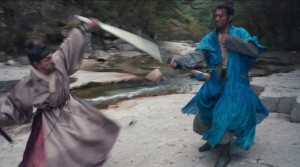
Of course, the focus is on Gang Dong-won ("Peninsula") as the outstanding swordsman and Park Jeong-min ("Miracle: Letters to the President") as the king's son who turns into a vengeful man, for whom the only thing that matters anymore is to kill his former friend. It goes without saying that this entails a lot of drama. Luckily, it's not laid on too thick, but on the other hand, you also get the impression that the relationship could have affected us a little more, if there were some layers added. If you are familiar with stories like these, you will also be able to figure out how it all ends. So, you shouldn't expect anything original here, but the story still works. Nevertheless, it has to be criticized that with the developments at the royal court and the Japanese unit, which will play a significant role later on, the story eventually reaches a point in which it simply wants too much. Less would have been more here. At least this way we get a pretty good finale, in which the three mortal enemies compete against each other in the spirit of "The Good, the Bad and the Ugly". It also doesn't hurt that the sword fights are done properly too.

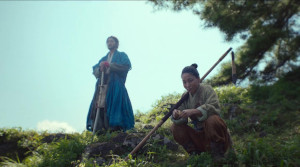
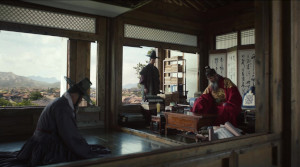

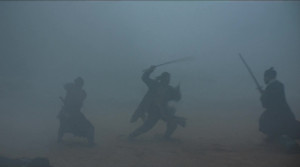
In most Korean period movies the action leaves much to be desired, because characters simply swing their swords around somehow. In "Uprising", however, we get great choreography that stays realistic but stands out thanks to its amazing energy. Lead actor Gang Dong-won deserves special praise here. The level of violence also surprises in a positive way. Limbs are repeatedly severed, but the movie doesn't turn out incredibly bloody either. Sets and costumes are excellent and director Kim Sang-man ("Midnight FM") is able to show that he knows what he is doing as he manages to capture the action dynamically, but also gives the quieter yet still tense moments at court the necessary level of suspense. In the end, you can have a really good time with "Uprising" because the movie doesn't have any longueurs, delivers good action and has a story that manages to draw you in, even if it's a bit overloaded. The cast is also fully invested. So, it's easy to get over the fact that the movie generally doesn't offer anything new with its story about friendship.

Disclaimer










